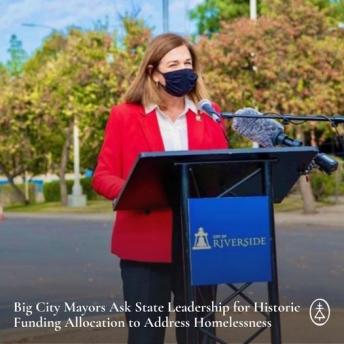Mayor Lock Dawson Joins Big City Mayors to Seek Funds to End Homelessness
Published: 04/29/2021
FOR IMMEDIATE RELEASE:
April 29, 2021
Contact:
Phil Pitchford
Public Information Officer
951-826-5975
Mayor Lock Dawson Joins Big City Mayors to Seek Funds to End Homelessness
Mayors from state’s largest cities ask legislators for $4 billion for programs proven to work
RIVERSIDE, Calif. – Mayor Patricia Lock Dawson was among mayors from California’s largest cities who came together virtually today (4/29) to ask the Governor and Legislative leaders to include a historic, multi-year investment of $4 billion annually in the state budget to permanently house nearly every Californian who entered a homeless shelter in 2020.
The investment would be the largest allocation of funds dedicated to fighting the homelessness crisis in U.S. history and could build more than 100,000 homes for unhoused residents in California, which is home to more than 25 percent of the nation’s unhoused residents.
There exists a unique opportunity to noticeably reduce homelessness around the state with the combination of the $26 billion California received from the American Rescue Plan, and the state’s record surplus, members of the Big City Mayors group said in a morning news conference.
“Residents in our cities have made it clear that homelessness is one of the greatest challenges of our time,” Lock Dawson said. This multibillion-dollar proposal allows us to address the gravity of this crisis in our cities and support long term solutions to homelessness such as Project Homekey, or non-traditional shelter models like our Riverside Village Community -- the first of its kind in Southern California. While we remain certain about recovering from this pandemic, we must also be equally certain and optimistic in our ability to meet the crisis of homelessness in our cities. And with this funding, a new sense of optimism begins.”
The news conference followed an action in early April by the BCM to send a letter to California State leadership, including State Senate President Pro Tempore Toni Atkins, Speaker Anthony Rendon, and Budget Committee Chairs Senator Nancy Skinner and State Assemblymember Phil Ting, outlining the desperate need for an ongoing source of funding for building new housing.
The $4 billion per year, multi-year request came from the average cost of a Project Homekey unit at $148,000. Mayors continue to utilize HEAP and HHAP funding, previous one-time State funding allocations, to build prefabricated dorms, modular housing, tiny homes, and shelters more cost-effectively with state and local dollars.
“We appreciate the unprecedented scale of this financial commitment, one appropriate to the unprecedented -- and growing -- scale of this massive crisis, one that will define our generation’s collective legacy. We urge flexible funding commensurate with our monumental task ahead -- and we thank you for your leadership and continued partnership,” the mayors wrote.
The BCM continues to work closely with the Governor’s office and State Legislature to address the housing and homelessness crisis and expressed their continued commitment to existing emergency interim housing operations along with supportive services that would not be possible without state assistance. This balanced allocation will help move unhoused residents off the streets while also sustaining existing programs to keep them housed.
“Our bipartisan coalition of large-city mayors know too well the urgency of addressing the homelessness that afflicts 161,000 of our fellow Californians,” said San José Mayor and BCM Chair, Sam Liccardo. “This year's budget provides California with a once-in-a-generation opportunity to dramatically reduce homelessness -- if we can muster the collective courage to stand up for our most vulnerable neighbors.”
Homelessness continues to become increasingly desperate in California. The state’s newly launched Homeless Data Integration System allows cities to better understand the ever-changing nature of homelessness services throughout the state. Of the 248,130 people local providers reported serving in 2020: 91,626 people (37%) moved into permanent housing, and 117,109 people (47%) remained actively engaged in services or shelter but were not yet permanently housed, underscoring the need for housing in California.
In 2020, more than 32,000 people received homelessness prevention assistance, more than double the number of people served in 2017. Of those who accessed services, 41 percent reported a disabling condition, 9 percent were veterans, 17 percent reported experiences with domestic violence, and 22 percent were under the age of 18. The funding that BCM is requesting will go directly to solutions to housing our most vulnerable individuals.
The BCM believes a consistent allocation of flexible funding to big cities will make a necessary and dramatic step to address the homelessness crisis across California and become a national model for addressing the crisis nationwide.
“Such a bold commitment would have a transformative and lasting impact on California, and make California a national model of compassion.” said the coalition.
The Big City Mayors met with State Leadership, and at their urging, both the Assembly and Senate have included $4 billion a year in funding over multiple years in their budget priorities, released earlier this week.
To read the full letter, click here.
The Big City Mayors is a coalition of Mayors across California’s 13 largest cities: Los Angeles, San Diego, San José, San Francisco, Fresno, Sacramento, Long Beach, Oakland, Bakersfield, Anaheim, Riverside, Santa Ana, and Stockton.
-30-


